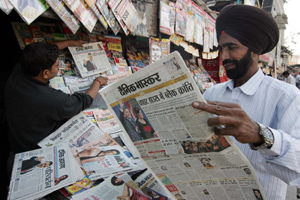NEW DELHI - India is among the few dozen countries, largely clustered in Asia and Africa, where sentiment in favour of the United States actually rose during the administration of George W. Bush. Nonetheless, more Indians favoured the election of Barack Obama than they did John McCain. What explains this seeming contradiction?

An Indian Sikh reads newspapers displaying front page headlines and photographs of US president-elect Barack Obama in Amritsar on Thursday |
|
At the heart of the Bush administration's success with India was a belief that India was a nation whose rise was beneficial to US interests. This led Bush to seek to adjust the international order to India's benefit, most notably by negotiating an exemption from the Nuclear Nonproliferation Treaty for India. The net result was a closer Indo-US relationship and a positive view of Bush that overrode unpopular actions such as invading Iraq.
Obama's election - the success of a member of a non-white minority in the world's oldest democratic polity - has seized the imagination of many Indians. He is exhorted in the media and among the intellectual classes. Among the most fervent supporters of Obama in the US have been the nearly three million-strong Indian-American community. "You can't swing a dead cat in the Obama camp without hitting an Indian-American," said an Obama advisor.
In the run-up to the election, many Indians could not believe that an African-American would ever be chosen to reside in the White House. His election inevitably enhanced the standing of the US as a land of genuine opportunity, a nation whose multicultural credentials were as great if not better than polyglot and poly-ethnic India.
The greatest scepticism about an Obama presidency lies among Indian strategic elite, who are focused on promoting India's economic and political interests in the wider world. They found an ally in that cause in Bush. Whatever Obama's ethnic credentials, India's government has detected in his statements reason to believe that he will be less supportive than Bush.
First, India is wary that any Democratic administration will include the same proponents of nuclear nonproliferation who opposed Bush's exemption for India. Obama has publicly said he intends to push for a comprehensive test ban treaty, a treaty that India opposes because it feels its own nuclear deterrent remains incomplete.
Second, Obama has attacked the outsourcing of service jobs to places like India and the offshoring of manufacturing jobs to Asia as a whole. His advisors also indicate that they will seek to incorporate social provisions, like labor standards, into future international trade negotiations. Though candidates tend to rollback from protectionist stances once they come to power, the Democrats' control of both houses of Congress may not give Obama that leeway.
Third, a Democratic administration has said it will put climate change at the forefront of its global policy concerns. If the focus is about mitigating carbon production through technological means, there will be few concerns. However, if the policy slips into more coercive measures such as carbon tariffs and the like, the result is likely to convert climate change into an energy security struggle. It will also pit the big carbon emitters of the future, like India and China, against present polluters like the US and Europe.
Finally, conversations with a few Obama advisors and his own speeches indicate that Washington's number one security concern in the coming years will be Afghanistan and Pakistan. "Iraq is yesterday's problem," said one advisor to an Indian audience several weeks ago.
At the heart of that problem, say Obama advisors, is the growing neurosis of the Pakistani regime. Pakistan suffers from internal strife and is prone to seeing conspiracies against it that include virtually all of its neighbors and often the US. Easing those fears is big concern in the US these days. One element in such a policy of reassurance, repeatedly said by Obama and most recently in a television interview, is to "try to resolve the Kashmir crisis so that they [Pakistan] can stay focused not on India, but on the situation with those militants."
This is a sensible goal, and one India's leaders will acknowledge as in their country's interest. But any Kashmir peace process that is seen to be a consequence of US pressure is politically dead on arrival in India. Kashmir is a diplomatic minefield. One misstep by the new Obama administration could result in a deep freeze of the Indo-US relationship for years.
Ultimately, the indicators are that the new Obama administration will seek to restore an international status quo that preceded the Bush presidency. This includes restoring ties with Europe, tightening the nuclear nonproliferation regime and possibly a restoration of China as the centerpiece of US policy in Asia. If so, the question for India will be whether this is accomplished by reducing the international space that the country gained under Bush.
If so, there is a strong likelihood that one area in which an Obama administration will fail to gain traction is in advancing the Indo-US relationship in areas outside the strictly economic.
(Pramit Pal Chaudhuri is the senior editor of the Hindustan Times and a member of the Asia Society International Council)
Copyright: Project Syndicate, 2008. Exclusive to The Sunday Times. |

